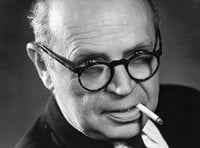Louis Poulsen’s PH Artichoke pendant, designed by Poul Henningsen in 1958, is a modern design icon and one of Henningsen's most famous lamps. PH Artichoke consists of 72 thin metal sheets which spread around the lamp's steel frame and open up like leaves of an artichoke. PH Artichoke was originally designed for the Langelinie Pavilion restaurant in Copenhagen, where it still hangs today. The enchanting luminaire catches the eye at home, office or any public space.
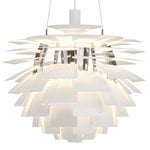
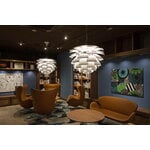

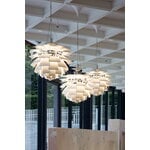
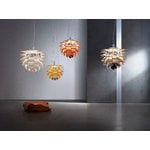
PH Artichoke, 600 mm, white
Louis Poulsen
Description
Louis Poulsen’s PH Artichoke pendant, designed by Poul Henningsen in 1958, is a modern design icon and one of Henningsen's most famous lamps. PH Artichoke consists of 72 thin metal sheets which spread around the lamp's steel frame and open up like leaves of an artichoke. PH Artichoke was originally designed for the Langelinie Pavilion restaurant in Copenhagen, where it still hangs today. The enchanting luminaire catches the eye at home, office or any public space.
Product details (19)
- Material
- Leaves: steel, Top shade: spun steel, Frame: steel, Suspension: aluminium
- Colour
- Painted white
- Width
- 60 cm
- Diameter
- 60 cm
- Height
- 58 cm
- Bulb base
- EU: E27
- Light source
- EU: 22-40W LED (not included) / US: Integrated dimmable 96W LED/2700K 2037lm
- IP rating
- EU: 20 / US: cULus, damp location
- Protection class
- I
- Voltage
- 220–240 V
- Nominal frequency
- 50–60 Hz
- Certifications and labels
- EU: CE marked, tested and approved according to European standards
- Cable length
- 400 cm
- Cable colour
- White
- Cable material
- Textile
- Weight
- 13.9 kg
- Canopy
- Yes (white)
- Ceiling plug
- No
- Dimmable
- No. EU: No, but can be fitted with an aligned dimmer. In this case, please use a dimmable light bulb. / US: Dim 0-10v
- Product ID
Designer
Poul Henningsen (1894-1967) was a famous Danish designer who studied at the Technical School at Frederiksberg, Denmark, from 1911 to 1914, and then at the Technical College in Copenhagen from 1914 to 1917. He started practicing traditional functionalistic architecture, but over the years his professional interests changed to focus mainly on lighting which is what he became famous for.
He also expanded his field of occupation into areas of writing, becoming a journalist and an author. His lifelong collaboration with Louis Poulsen Lighting began in 1925 and lasted until his death. To this day, Louis Poulsen Lighting still benefits from his genius. Poul Henningsen was also the first editor of the company magazine “NYT”. Poul Henningsen’s pioneering work concerning the relations between light structures, shadows, glare, and color reproduction – compared to man’s need for light remains the fondation of the lighting theories still practiced by Louis Poulsen Lighting.
Read an article about Poul Henningsen >
View all productsReviews (1)
5
Based on 1 reviews
-
O
Osmo P
👍
445 days ago
Sustainability
This product does not yet have a sustainability rating.
Learn more.




